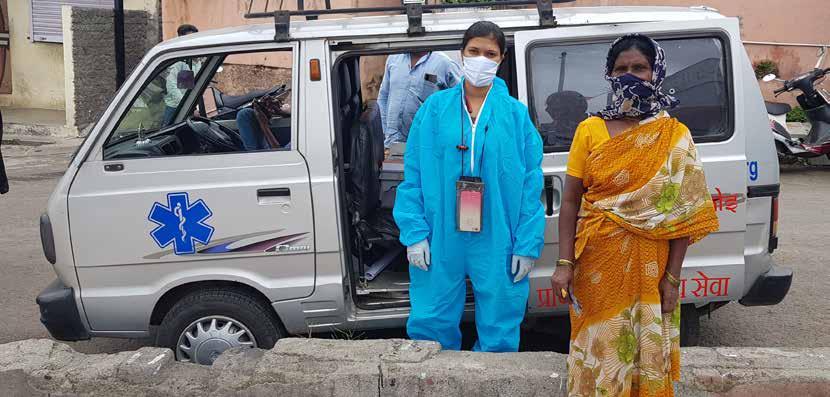
4 minute read
One year on from India’s COVID-19 crisis
In May 2021, India became the epicentre of the COVID-19 pandemic, recording over 400,000 daily cases and making headlines around the world as the Delta variant and a wide-reaching health crisis unfolded.
With millions hungry, stranded, sick or unable to isolate safely, the COVID-19 crisis spread from cities to rural areas with a lack of health resources and access to care, leaving some of India’s poorest communities vulnerable and their essential health systems decimated.
In response to the escalating health crisis, Opportunity International moved quickly to mobilise our existing relationships with microfinance institutions in the community and ease the pressure on India’s existing health services by providing relief to those hardest hit by the virus’ second wave of infections.
Less than three per cent of India’s population had received two doses of the COVID-19 vaccine as the country saw a record-breaking surge of cases in mid-2021. The challenge of vaccinating such a populous country and targeting rampant misinformation required a locally-led health response.
To expedite mass vaccinations to improve immunity, we collaborated with local governments and our community-based partners to organise and facilitate vaccination camps, given our partners’ trusted presence in communities.
As of May 2022, over 5.2 million people were vaccinated in over 43,000 camps. With vaccination camps reaching an average of 110 people daily, beneficiaries were often able to travel to them by foot, a key factor in the program’s wide reach, with many referred through our existing networks of local women microentrepreneurs. The vaccination camp program included camps across 15 states of India, including remote and tribal regions of Tamil Nadu and Kerala. More than 100,000 people were referred successfully for vaccinations and 739 villagelevel resilience committees created in remote regions for localised response and training on COVID-19 resilience.
With misinformation rampant during India’s vaccine roll-out, particularly for vulnerable communities, Opportunity worked closely with our communitybased microfinance partners, to deliver education and training – via SMS, WhatsApp, comics, posters, voice messages and in-person meetings (where possible). Through this work, Opportunity reached more than 10 million people with education on COVID-19 prevention, transmission and management. Over 3,500 frontline workers were trained to support the COVID-19 response in their villages, including 1,200 Health Leaders, reaching 8,500 people in high-hesitancy communities to address misinformation.
In addition to mobilising mass vaccinations, targeting misinformation and providing training, Opportunity assisted those in the community who contracted COVID-19 and needed help to manage symptoms and isolate safely.
Food ration kits, sanitary kits and medicine were distributed to those with mild symptoms or exposure to COVID-19 to help them isolate safely at home, over 34,000 people received dry ration kits to support safe isolation and 1,200 villages were equipped with essential medicines and supplies like pulse oximeters and paracetamol.
To manage COVID-19 cases and mental health at home, we provided remote care through telemedicine (via a helpline and mobile app) with more than 4,600 individuals receiving free telemedicine consultations on COVID-19 symptoms at home, helping lift the burden on India’s existing health systems.

For people with worsening COVID-19 symptoms, we worked with partners to set up quarantine facilities, and free “doctor at your doorstep” vans in high-risk containment zones served more than 24,000 people in the Pune region.
“Through the COVID-19 crisis, it has become apparent that there is tremendous and underutilised opportunity to leverage existing microfinance institution communities to provide access to essential health services and ensure lives are saved,” said Scott Walters, CEO of Opportunity.
As the situation in India started to improve, in late 2021, these health initiatives were rolled out to Indonesia and Nepal to address urgent needs for vaccinations and oxygen concentrator distribution and help meet the escalating needs.
As Indonesia was hit hard by worsening COVID-19 case numbers in August 2021, we mobilised our microfinance partners across Indonesia delivering education on prevention, transmission and management of COVID-19 to more than one million households with training modules available in English and Bahasa. Oxygen concentrators were delivered to public hospitals with a high burden of COVID-19 cases, and vaccinations to over 12,000 people in underserved West Java, of whom 8 per cent were young people with special needs.
With the help of existing Community Health Leaders, trained through our health programs, education and training on COVID-19 prevention and misinformation reached communities across Indonesia, including those in regional areas.
In Nepal, over 50 of our microfinance institutions reached one million households with education on COVID-19 prevention, transmission and training available in English and Nepali.
2022 and beyond
In 2022, the program now moves from COVID response to COVID resilience. We aim to help families and communities recover from the devastation of 2021 by equipping locallyled COVID-19 prevention efforts in India. The community infrastructure will become more effective and trusted, and families living in poverty will become more resilient in their recovery after COVID-19.
In addition to small business loans and ongoing health programs equipping Health Leaders at a local level, Opportunity is investing in three key areas to improve access and opportunities for families in need.
Vaccination Hubs
This award-winning public-private partnership uses our existing microfinance partners to mobilise people across Asia to be vaccinated, particularly in marginalised and rural communities.
Social Protection
A new initiative, the Social Protection Program helps vulnerable, often illiterate individuals navigate and unlock social support payments available to marginalised groups.
Employment and skill development
This new partnership aims to place unemployed and disadvantaged youth in vocational training for in-demand career paths, not only boosting vital areas of the workforce in India and Indonesia, but also providing income and meaningful employment for the next generation to lift themselves out of poverty.







